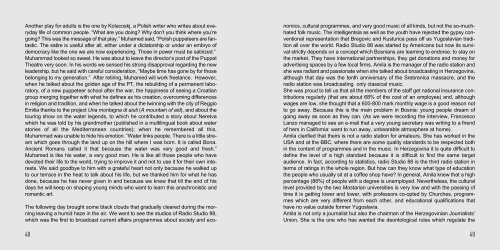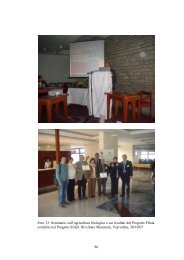Dove non suoanano più i fucili - Europuglia
Dove non suoanano più i fucili - Europuglia
Dove non suoanano più i fucili - Europuglia
Create successful ePaper yourself
Turn your PDF publications into a flip-book with our unique Google optimized e-Paper software.
Another play for adults is the one by Kolacoskj, a Polish writer who writes about everyday<br />
life of common people. “What are you doing? Why don’t you think where you’re<br />
going? This was the message of that play.” Muhamed said, “Polish puppeteers are fantastic.<br />
The satire is useful after all, either under a dictatorship or under an embryo of<br />
democracy like the one we are now experiencing. Those in power must be satirized.”<br />
Muhammad looked so sweet. He was about to leave the director’s post of the Puppet<br />
Theatre very soon. In his words we sensed his strong disapproval regarding the new<br />
leadership, but he said with careful consideration, “Maybe time has gone by for those<br />
belonging to my generation.” After retiring, Muhamed will work freelance. However,<br />
when he talked about the golden age of the PT, the rebuilding of a permanent laboratory,<br />
of a new puppeteer school after the war, the happiness of seeing a Croatian<br />
group merging together with what he defines as his creation, overcoming differences<br />
in religion and tradition, and when he talked about the twinning with the city of Reggio<br />
Emilia thanks to the project Una montagna di aiuti (A mountain of aid), and about the<br />
touring show on the water legends, to which he contributed a story about Neretva<br />
which he was told by his grandmother (published in a multilingual book about water<br />
stories of all the Mediterranean countries); when he remembered all this,<br />
Muhammad was unable to hide his emotion. “Water links people. There is a little stream<br />
which goes through the land up on the hill where I was born. It is called Bona.<br />
Ancient Romans called it that because the water was very good and fresh.”<br />
Muhamed is like his water, a very good man. He is like all those people who have<br />
devoted their life to the world, trying to improve it and not to use it for their own interests.<br />
We said goodbye to him with a grateful heart not only because he walked up<br />
to our terrace in the heat to talk about his life, but we thanked him for what he has<br />
done, because he has never given in and because we knew that till the end of his<br />
days he will keep on shaping young minds who want to learn this anachronistic and<br />
romantic art.<br />
The following day brought some black clouds that gradually cleared during the morning<br />
leaving a humid haze in the air. We went to see the studios of Radio Studio 88,<br />
which was the first to broadcast current affairs programmes about society and eco-<br />
48<br />
nomics, cultural programmes, and very good music of all kinds, but not the so-muchhated<br />
folk music. The intelligentsia as well as the youth have rejected the gypsy conventional<br />
representation that Bregovic and Kusturica pass off as Yugoslavian tradition<br />
all over the world. Radio Studio 88 was started by Americans but now its survival<br />
strictly depends on a concept which Bosnians are learning to endorse: to stay on<br />
the market. They have international partnerships, they get donations and money for<br />
advertising spaces by a few local firms. Amila is the manager of the radio station and<br />
she was radiant and passionate when she talked about broadcasting in Herzegovina,<br />
although that day was the tenth anniversary of the Srebrenica massacre, and the<br />
radio station was broadcasting only classical music.<br />
She was proud to tell us that all the members of the staff get national insurance contributions<br />
regularly (that are about 68% of the cost of an employee) and, although<br />
wages are low, she thought that a 600-800 mark monthly wage is a good reason not<br />
to go away. Because this is the main problem in Bosnia: young people dream of<br />
going away as soon as they can. (As we were recording the interview, Francesco<br />
Lanzo managed to see an e-mail that a very young secretary was writing to a friend<br />
of hers in California: want to run away, unbearable atmosphere at home).<br />
Amila clarified that theirs is not a radio station for amateurs. She has worked in the<br />
USA and at the BBC, where there are some quality standards to be respected both<br />
in the content of programmes and in the music. In Herzegovina it is quite difficult to<br />
define the level of a high standard because it is difficult to find the same target<br />
audience. In fact, according to statistics, radio Studio 88 is the third radio station in<br />
terms of ratings in the whole region. But how can they know what type of education<br />
the people who usually sit at a coffee shop have? In general, Amila knew that a high<br />
percentage (88%) of people with a degree is unemployed. Nevertheless, the cultural<br />
level provided by the two Mostarian universities is very low and with the passing of<br />
time it is getting lower and lower, with professors co-opted by Churches, programmes<br />
which are very different from each other, and educational qualifications that<br />
have no value outside former Yugoslavia.<br />
Amila is not only a journalist but also the chairman of the Herzegovinian Journalists’<br />
Union. She is the one who has wanted the deontological rules which regulate the<br />
49





